Cadillac Records Blu-ray Movie
HomeCadillac Records Blu-ray Movie 
Sony Pictures | 2008 | 108 min | Rated R | Mar 10, 2009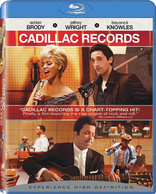
Movie rating
6.7 | / 10 |
Blu-ray rating
| Users | 3.5 | |
| Reviewer | 2.5 | |
| Overall | 3.1 |
Overview
Cadillac Records (2008)
In this tale of sex, violence, race and rock and roll in 1950's Chicago, 'Cadillac Records' follows the exciting but turbulent lives of some of America's musical legends, including Muddy Waters, Leonard Chess, Little Walter and Howlin' Wolf, Etta James and Chuck Berry.
Starring: Adrien Brody, Jeffrey Wright, Gabrielle Union, Columbus Short, Cedric the EntertainerDirector: Darnell Martin
| Music | Uncertain |
| Romance | Uncertain |
| Drama | Uncertain |
Specifications
Video
Video codec: MPEG-4 AVC
Video resolution: 1080p
Aspect ratio: 2.40:1
Original aspect ratio: 2.39:1
Audio
English: Dolby TrueHD 5.1
French: Dolby TrueHD 5.1
Subtitles
English, French
Discs
50GB Blu-ray Disc
Single disc (1 BD)
BD-Live
Playback
Region free
Review
Rating summary
| Movie | 2.5 | |
| Video | 3.0 | |
| Audio | 3.0 | |
| Extras | 1.5 | |
| Overall | 2.5 |
Cadillac Records Blu-ray Movie Review
Behind every great record label is great music, great musicians and a great producer.
Reviewed by Greg Maltz March 23, 2009When I first got into blues and jazz, one of the more superficial observations I made was that my favorite artists were predominantly black and the record label producers were predominantly white. On the surface, this looked bad. Were wealthy, privileged businessmen with little regard for the music taking advantage of poor, downtrodden musicians who didn't understand the value of their talent? The Blue Note label caught my attention because it had brought together the sidemen from John Coltrane's quartet and Miles Davis' quintet of the 1960s. I realized that those legendary sessions would have never been produced if not for Blue Note's founder, Alfred Lion. The more I read about Lion, the more I realized he cared deeply about the music and the musicians, paying them for practice sessions in addition to the recording sessions (which was unheard of at the time), going over each composition and in some cases inviting musicians to his home for dinner. The label was not a lucrative undertaking for him and he had to sell Blue Note in the late 1960s. The story of Alfred Lion has many similarities to the story of Lejzor Czyz a Polish American who changed his name to Leonard Chess and founded Chess records.
Unfortunately, Cadillac Records is an opportunity missed to tell a serious, cohesive story about Leonard Chess (Adrien Brody). The film can't decide whether it wants to focus on Chess, Muddy Waters (Jeffrey Wright), Etta James (Beyonce Knowles), Little Walter (Columbus Short) or Chuck Berry (Mos Def). It becomes even more schizophrenic when other artists are introduced, including Howlin' Wolf, Hubert Sumlin and Willy Dixon (but there is no sign of Chess stars Buddy Guy or Bo Diddley). Under the fictitious name of Cadillac Records, the story of Chess is watered down by writer/director Darnell Martin who strings together chopped up vignettes instead of a flowing narrative that seriously attempts to get inside the head of any character. She also relies too heavily on cliche and the audience's preconception of racism, musicians and the music business rather than chronicle what was different and unique about Chess Records. By focusing on style over substance, Martin makes a more commercial movie, but misses the mark. In the right hands, with the right focus and script, the story could have been a masterpiece. Indeed, a great deal of effort was put into making Cadillac Records a period piece, but we've all seen better. Likewise, the Blu-ray features good picture and sound, but nothing spectacular.
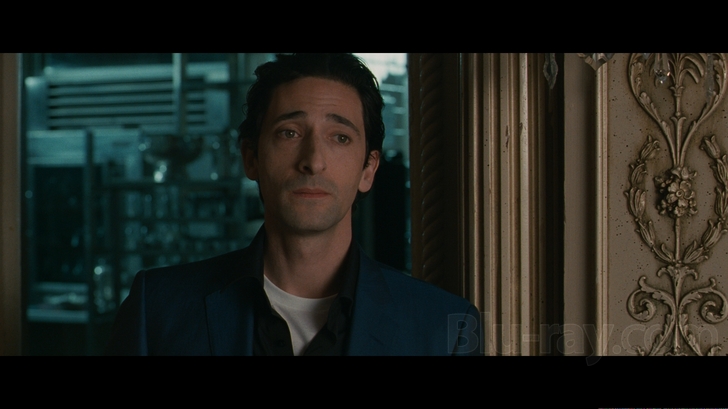
Adrien Brody plays Leonard Chess, a Polish Jew who immigrated to the US and changed his name from Lejzor Czyz.
Early in the film, Martin defines the two main characters of Leonard Chess and Muddy Waters. While Muddy is shown to have origins as a poor sharecropper in the south, Chess is basically shown to have pulled himself up from his sleazy junkyard owner bootstraps. His main ambition is to open a club and get himself a cadillac. But this ignores a more complex reality. It is no accident that Leonard Chess and other Jewish immigrants had a deep affinity for black music and black musicians, and Martin missed an opportunity to explore the reasons. Jews were treated as second-class citizens in Europe and were to some extent defined by the story of Exodus and the ideal of uplifting humanity from slavery to freedom.
In the music and the plight of African Americans, immigrants like Chess found a voice they knew from within themselves. This bond was powerful. To Martin's credit, she tries to show that Chess was driven by more than money. His dedication to the musicians was heartfelt and the way his believed in the talent he signed was sincere. He gave cadillac cars to contract musicians he signed to the label. He served as much as social worker and father as record producer, making sacrifices for them. These sacrifices ranged from lending money to straightening out arrest warrants to insisting Little Walter take time off when his mother passed away. But Chess is also portrayed as a ruthless businessman, bribing radio stations and at one point even paying off the cops.
The most interesting relationship portrayed in the film is between Etta James and Chess. This part of the story doesn't even begin until the arcs of Muddy Waters, Little Walter and Chuck Berry are played out, making an unfocused plot even messier. But Knowles turns in a good performance as James and her vocals are the musical highlight of the film. Brody, by far the best actor on board, does an admirable job showing a unique mixture of pity, admiration and love for James. He manages to avoid falling into the cliched roles of father figure, business manager or lover and relates to James on an altogether unique level. The chemistry between Knowles and Brody is strong on screen and their scenes together are as close to film magic that we get in Cadillac Records. Though James and Chess came from different backgrounds and met at much different stages of life, they are in a way kindred spirits. Still, as heavy as the movie tries to get, it remains lightweight fare.
Cadillac Records Blu-ray Movie, Video Quality 
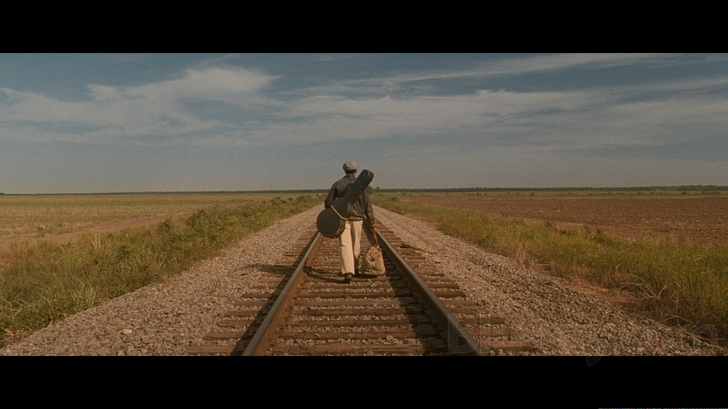
Without careful analysis, the picture quality at first seems excellent, with good definition, warmth and deep blacks. But from a videophile perspective, the Blu-ray picture is not perfect. Signs of digital processing include flatness and perhaps some grain reduction for a very polite presentation that lacks lifelike vividness. Detail and depth are held back compared to reference quality Blu-ray discs. The night scenes are the prime examples when minimal shadow detail and relatively 2-D presentation tend to get in the way. Watch the scene when Chess comes to the rescue of James who has overdosed. The characters seem to stand out artificially in front of a black backdrop with almost no grayscale gradients that cue the viewer in to depth. Granted, part of this is attributable to the way Cadillac Records is shot and produced and cannot be blamed on the transfer and processing. For the most part, skin color is good, clothing appears to have defined texture and landscapes are detailed and bright.
An interesting element of the picture quality of Cadillac Records is its very modern, vibrant color scheme which did not lend itself to a period piece of the 1950s. One would have thought any digital postproduction should dirty up the picture or make the colors a bit more subdued. But digital processing seems to have been used for exactly the opposite: to make the picture aseptic and pump up the brightness and contrast a touch. The overall effect isn't bad; it's just not reminiscent of film--especially not film from half a century ago.
Cadillac Records Blu-ray Movie, Audio Quality 
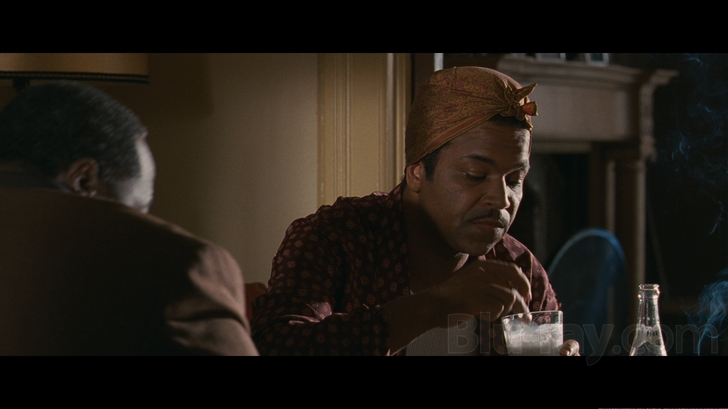
Like the video, the Dolby TrueHD 5.1 track appears to have been subject to noise reduction or some other digital processing. It sounds polite, with modern dynamics that lack the bite and grit of good recordings from the '50s. The Chess sound was dirty and dark, with a forward presentation, but the sound of Cadillac Records is marked by rolled off highs and an ever-so-slight digital sheen. It has a more laid-back presentation. The mix is very light on bass and surrounds, anchoring all the sound up front for a nearly monaural soundstage. Acoustic guitars have an aseptic feel, with none of the lively resonances that mark great recordings. The distorted electric guitar, often played with the slide blues style, is also subdued with much of the bite taken out of it. The audio of Cadillac Records makes for a polite guitar, which is not something I'd ever expect to say about music associated with Chess Records. To put it in perspective, these quibbles are for audiophiles to debate and the average movie fan will appreciate the clean sound. Dialog is crisp and appears well recorded, although the same type of processing has been applied.
Cadillac Records Blu-ray Movie, Special Features and Extras 
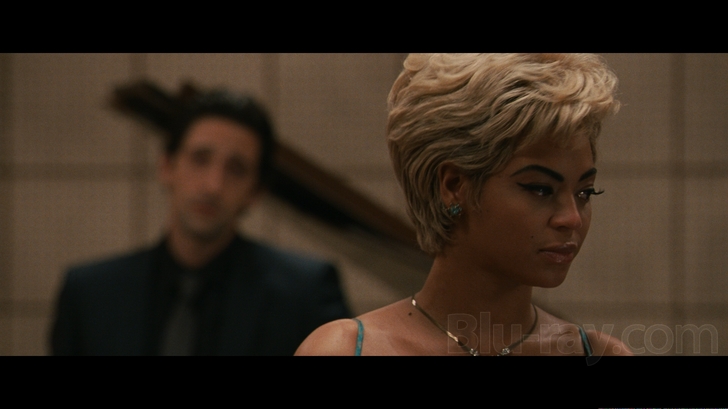
Occasionally, supplementary material is self-promotional of the filmmaker's talent and the production merits to the exclusion of the real era, people and stories behind the movie. But when it comes to the featurettes of Cadillac Records, self-promotional is an understatement. the supplements were so focused on style over substance that it was little wonder Darnell Martin had taken her eye off the ball. I had a genuine stomach ache by the time I finished watching Martin and her crew wax philosophic about racism in the '40s and '50s and gush about how the color red in Chuck Berry's shirt is what made him appear "powerful".
For fans of blues and collectors of Chess LPs, this content is utterly worthless. The supplements, like the film, were an opportunity lost to really address the influences that had helped shape popular music. Instead, it became an opportunity for Martin and company to cash in on pioneers like Chess, Muddy, Wolf and James, which at times in the script is what Martin accused Leonard Chess of doing. If only she could apply that criticism to herself. The bonus content should have included a family tree of bluesmen and their backup musicians and influences or a discography of Chess records or how about a featurette on the ins and outs of spinning wax and collecting rare Chess LPs? The real music of Chess took a backseat to the music of Cadillac. Did I say a backseat? It was shoved out the door altogether in favor of Martin's conception. These issues are borne out in:
Playing Chess: the Making of Cadillac Records--Extensive commentary with writer/director Darnell Martin.
Once Upon a Blues: Cadillac Records by Design--The epitome of style over substance. Martin and her crew discuss the sets and costumes. What's the point of getting these details right and screwing up the story?
Blu-ray exclusive: The Chess Record Player--An interactive playlist feature that allows you to create and share a list of songs featured in the movie. Far be it from Martin or Sony to push for real songs recorded by Chess.
Rounding out the bonus content are deleted scenes and some trailers.
Cadillac Records Blu-ray Movie, Overall Score and Recommendation 
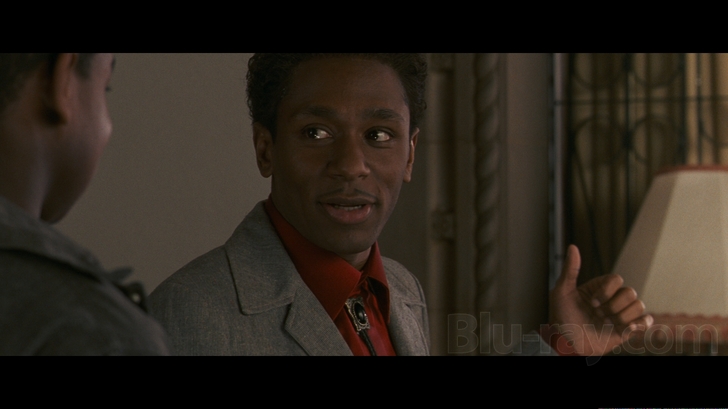
Cadillac Records is an exercise in making a movie for the sake of moviemaking. There is no true passion for the subject matter that permeates the production. The stories of Muddy Waters, Leonard Chess, Etta James, Little Walter, Howlin Wolf and Chuck Berry are told in the most superficial ways. Other great Chess bluesmen like Buddy Guy are completely missing. Individual Chess hits that topped the charts are celebrated by awkwardly edited footage of a bandstand or studio performance with closeups of the Billboard charts listings. Nowhere is the soul inside the music explored and only rarely are the lives of the characters seriously portrayed, except perhaps for a couple Etta James scenes. The film does have some quality performances, most notably Adrien Brody who does a lot with the script he was given. The production also shows good attention to period piece props. For those with passing interest in blues or Chess Records, the Cadillac Records Blu-ray may serve as a decent introduction, although I would strongly suggest discovering the original recordings or the books by Richard Cohen. The video, audio and story presented in Martin's film aren't particularly worthy.
Similar titles
Similar titles you might also like

A Star Is Born
2018

The Cotton Club Encore
1984

That'll Be the Day
1973

The Mambo Kings
1992

Miles Ahead
2015

Saturday Night Fever 4K
45 Year Anniversary | Theatrical Cut / Director's Cut on standard Blu-ray
1977

We Are Your Friends
2015

Carmen
1984

I Saw the Light
2015

The Wrecking Crew
2008

Lady Sings the Blues
1972

La Bamba
1987

Her Smell
2018

Change of Habit
1969

Great Balls of Fire!
1989

Judy
2019

Sparkle
2012

Valley of the Dolls
1967

Not Fade Away
2012

Glitter
2001